Unlocking the Potential of AI in Accounting: Tools to Simplify Your Financial Tasks
Last Updated on August 8, 2023
Welcome to the future of accounting! As businesses continue to evolve and data-driven decision-making becomes the norm, the role of artificial intelligence (AI) in accounting has become increasingly vital. Gone are the days of manually crunching numbers and sifting through piles of paperwork. With the right AI tools, you can streamline your financial tasks, boost efficiency, and gain valuable insights into your business’s financial health. In this article, we will explore the exciting world of AI in accounting and uncover the tools that can revolutionize the way you manage your finances. From automated data entry and intelligent expense tracking to predictive analytics and fraud detection, these AI-powered solutions are designed to simplify your day-to-day tasks and free up your time to focus on strategic decision-making. So, let’s dive in and unlock the true potential of AI in accounting!
Benefits of using AI in accounting
AI has the potential to transform the accounting industry in numerous ways. By automating repetitive and time-consuming tasks, AI can significantly increase productivity and accuracy. This technology also enables accountants to analyze vast amounts of financial data quickly, providing valuable insights and actionable recommendations. Additionally, AI-powered tools can detect patterns and anomalies that may indicate fraud or financial irregularities, enhancing overall security. By harnessing the power of AI, accounting professionals can streamline their workflows, improve decision-making, and deliver more value to their clients or organizations.
One of the primary benefits of using AI in accounting is the automation of financial tasks. Traditionally, accountants spent countless hours manually entering data, reconciling accounts, and generating reports. With AI, these processes can be automated, saving time and reducing the risk of errors. Automated data entry, for example, eliminates the need for manual input by extracting information from invoices, receipts, and other documents. This not only speeds up the data entry process but also reduces the likelihood of data entry errors. AI-powered tools can also automate bank reconciliations, flagging any discrepancies and minimizing the time spent on manual reconciliation.
Another key benefit of using AI in accounting is intelligent expense tracking. AI-powered expense management tools can categorize and analyze expenses, making it easier to monitor spending patterns and identify areas for cost savings. These tools can automatically capture receipt data, extract relevant information, and categorize expenses based on predefined rules. This not only simplifies the expense tracking process but also provides real-time insights into your organization’s spending habits. With AI, you can easily identify excessive spending, track expense trends, and make informed decisions to optimize your financial resources.
Furthermore, AI-based invoice processing solutions can revolutionize the way you handle invoicing. These tools can automatically extract invoice data, match it with purchase orders or contracts, and generate accurate invoices. By automating the invoice processing workflow, you can reduce the time and effort required to process invoices, minimize errors, and improve cash flow management. AI-powered invoice processing solutions also provide real-time visibility into the status of invoices, enabling you to track outstanding payments and take proactive measures to accelerate invoice processing and improve cash flow.
Best AI accounting software
Bill.com
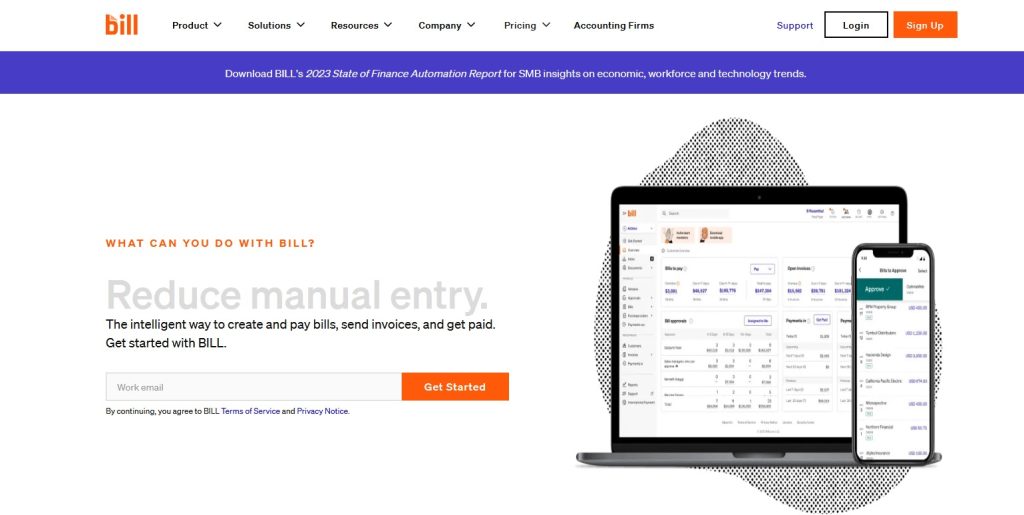
Bill.com is a cloud-based financial management platform that helps businesses automate their accounts payable and receivable processes. It offers a variety of features, including:
- Invoice management: Bill.com can automatically import invoices from email, PDF, or other file formats. It also includes OCR capabilities to help you quickly and easily capture data from paper invoices.
- Payment processing: Bill.com allows you to pay invoices electronically, either through ACH or wire transfer. You can also set up recurring payments and automatic approvals.
- Expense tracking: Bill.com can help you track your expenses and create reports to see where your money is going.
- Accounts receivable: Bill.com can help you send invoices to your customers, track payments, and manage collections.
- Team collaboration: Bill.com allows you to collaborate with your team on invoices, payments, and expenses.
Here are some additional thoughts on Bill.com:
- The OCR feature is very helpful for quickly capturing data from paper invoices.
- The mobile apps are well-designed and easy to use.
- The customer support team is responsive and helpful.
- The pricing can be a bit high, especially for small businesses.
Overall, I would recommend Bill.com to businesses that are looking for a comprehensive financial management platform. However, I would recommend that small businesses consider other options before choosing Bill.com, as the pricing may be too high for their needs.
VIC.AI
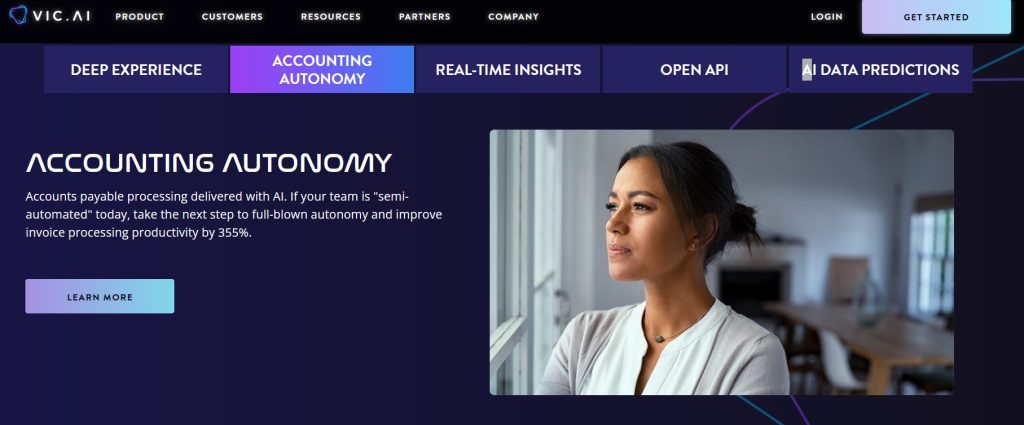
VIC.AI is an AI-powered accounts payable automation platform that helps businesses save time and money. It uses machine learning to automatically process invoices, match them to purchase orders, and approve payments. VIC.AI also provides insights into spending habits and trends, which can help businesses make better financial decisions.
Features:
- Invoice automation: VIC.AI can automatically import invoices from email, PDF, or other file formats. It also includes OCR capabilities to help you quickly and easily capture data from paper invoices.
- Payment processing: VIC.AI allows you to pay invoices electronically, either through ACH or wire transfer. You can also set up recurring payments and automatic approvals.
- Expense tracking: VIC.AI can help you track your expenses and create reports to see where your money is going.
- Spend insights: VIC.AI provides insights into your spending habits and trends, which can help you make better financial decisions.
- Integrations: VIC.AI integrates with a variety of accounting software, including QuickBooks, Xero, and SAP.
Overall:
VIC.AI is a powerful AI-powered accounts payable automation platform that can help businesses save time and money. It is easy to use and integrates with popular accounting software. However, it can be expensive for small businesses and not all features are available to all plans.
Docyt.com
Docyt.com is a cloud-based financial management platform that helps businesses automate their accounts payable and receivable processes. It offers a variety of features, including:
- Invoice management: Docyt.com can automatically import invoices from email, PDF, or other file formats. It also includes OCR capabilities to help you quickly and easily capture data from paper invoices.
- Payment processing: Docyt.com allows you to pay invoices electronically, either through ACH or wire transfer. You can also set up recurring payments and automatic approvals.
- Expense tracking: Docyt.com can help you track your expenses and create reports to see where your money is going.
- Accounts receivable: Docyt.com can help you send invoices to your customers, track payments, and manage collections.
- Team collaboration: Docyt.com allows you to collaborate with your team on invoices, payments, and expenses.
Pricing varies and starts at $50 for back office automations and than jumps to $149/month- $999/month plans for bookkeeping automations. if you are an Accounting Firm or CFO Service you would need to get in touch with a sales rep to get quote.
Booke.ai
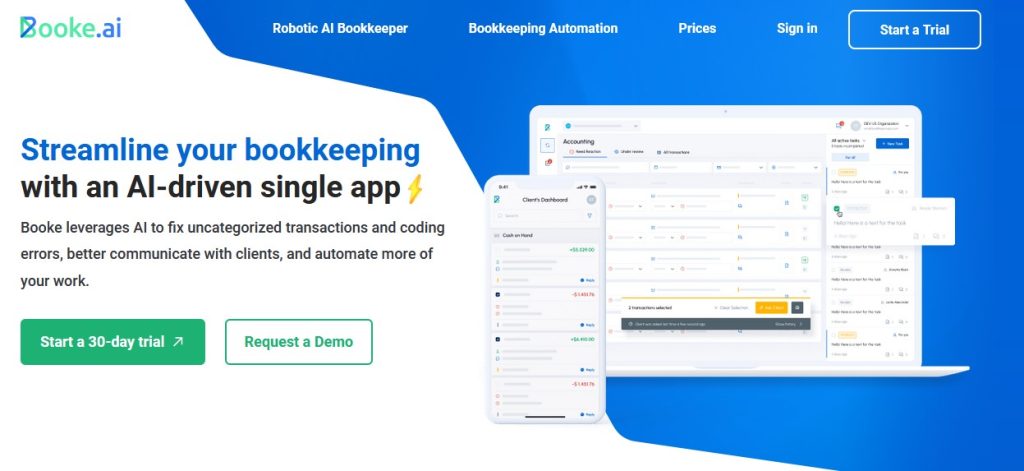
Booke.ai is an AI-powered bookkeeping platform that helps businesses automate their bookkeeping tasks. It uses machine learning to automatically categorize transactions, reconcile bank statements, and identify potential errors. Booke.ai also provides insights into spending habits and trends, which can help businesses make better financial decisions.
Features:
- Invoice and receipt OCR: Booke.ai can automatically extract data from invoices and receipts, including the date, amount, and vendor.
- Transaction categorization: Booke.ai uses machine learning to automatically categorize transactions, which can save businesses time and improve accuracy.
- Bank statement reconciliation: Booke.ai can automatically reconcile bank statements, which can help businesses identify potential errors.
- Spending insights: Booke.ai provides insights into spending habits and trends, which can help businesses make better financial decisions.
- Integrations: Booke.ai integrates with a variety of accounting software, including QuickBooks, Xero, and SAP.
Their pricing is per client and the lowest plan starts at $9/month per client. Which can be worth it for small businesses, but probably can get pretty expensive the bigger the business is.
ZENI.AI– Best for startups
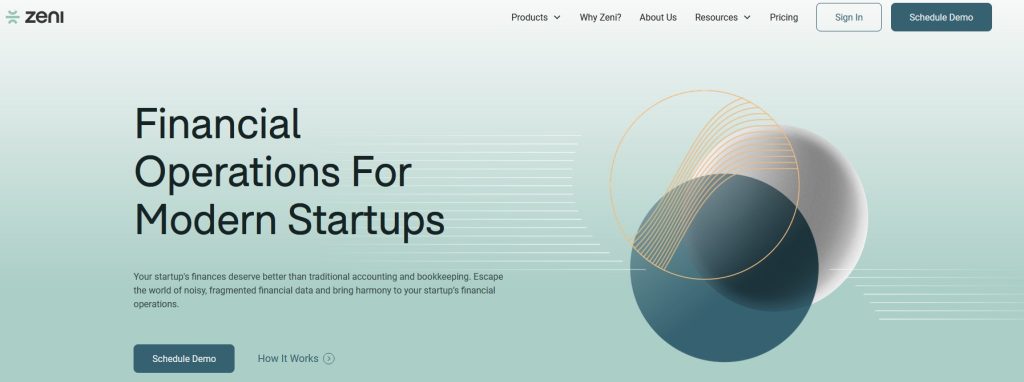
Zeni.ai is a powerful AI-powered accounting platform that can help businesses save time and money. It is easy to use and integrates with popular accounting software. However, it can be expensive for small businesses and not all features are available to all plans.
Here are some additional thoughts on Zeni.ai:
- The OCR feature is very helpful for quickly extracting data from invoices and receipts.
- The insights into spending habits are very helpful for making better financial decisions.
- The AI-powered workflows can save businesses a lot of time and hassle.
- The customization options allow businesses to tailor Zeni.ai to their specific needs.
- The customer support team is responsive and helpful.
- The pricing can be a bit high, especially for small businesses.
truewind.ai
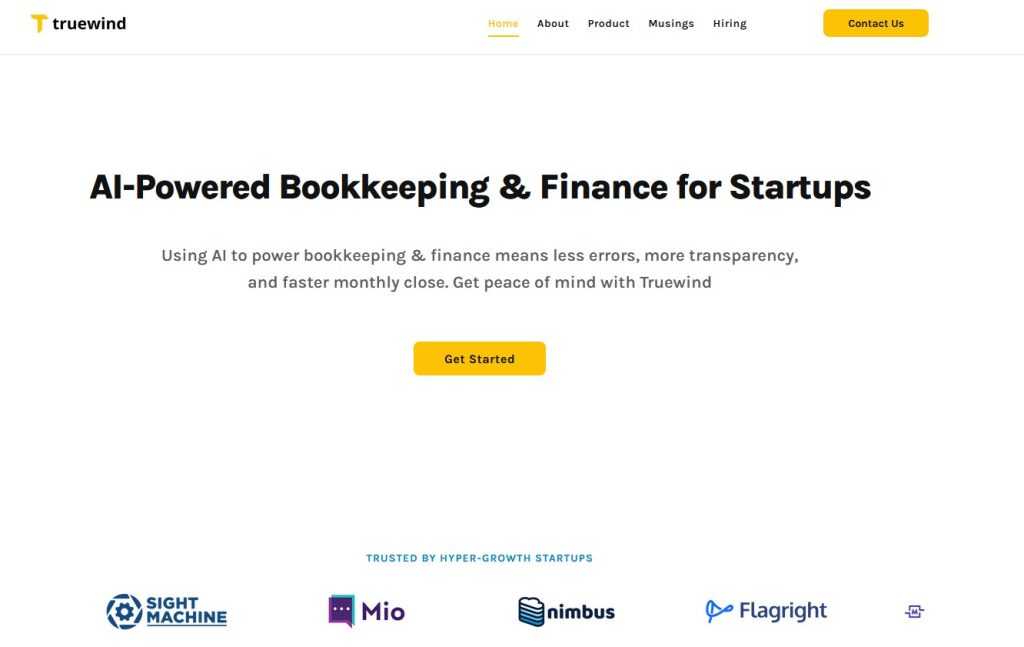
Truewind.ai is an AI-powered bookkeeping and finance platform that helps startups automate their financial processes. It uses machine learning to automatically categorize transactions, reconcile bank statements, and identify potential errors. Truewind.ai also provides insights into spending habits and trends, which can help startups make better financial decisions.
Features:
- Invoice and receipt OCR: Truewind.ai can automatically extract data from invoices and receipts, including the date, amount, and vendor.
- Transaction categorization: Truewind.ai uses machine learning to automatically categorize transactions, which can save startups time and improve accuracy.
- Bank statement reconciliation: Truewind.ai can automatically reconcile bank statements, which can help startups identify potential errors.
- Spending insights: Truewind.ai provides insights into spending habits and trends, which can help startups make better financial decisions.
- Integrations: Truewind.ai integrates with a variety of accounting software, including QuickBooks, Xero, and SAP.
- Financial modeling: Truewind.ai can help startups create financial models, which can be used to plan for future growth.
- Investor reporting: Truewind.ai can help startups create investor reports, which can be used to keep investors informed of the company’s financial performance.
AI accounting software Categories
Each business has its own unique structure and needs. When considering AI accounting software, it’s best to prioritize the categories that are most important for your business.
AI-powered bookkeeping software
AI-powered bookkeeping software automates the process of recording financial transactions, categorizing expenses, and generating financial statements. These tools use machine learning algorithms to learn from historical data, making them smarter over time. With AI-powered bookkeeping software, you can automate the recording of transactions, reducing the need for manual data entry. These tools can also categorize expenses based on predefined rules, saving time and improving accuracy. By automating bookkeeping tasks, you can focus on more strategic aspects of your business and gain real-time insights into your financial health.
AI-driven expense management tools
Expense management is a critical aspect of financial management for any business. AI-driven expense management tools simplify the process of tracking, managing, and analyzing expenses. These tools can automatically capture receipt data, extract relevant information, and categorize expenses based on predefined rules. AI-driven expense management tools provide real-time visibility into your organization’s spending habits, allowing you to identify areas for cost savings and make informed decisions. By automating expense management, you can streamline the approval process, reduce the risk of errors, and improve overall financial control.
AI-based invoice processing solutions
AI-based invoice processing solutions automate the entire invoice processing workflow, from capturing invoice data to generating accurate invoices. These tools use machine learning algorithms to extract invoice data, match it with purchase orders or contracts, and flag any discrepancies. By automating invoice processing, you can significantly reduce the time and effort required to process invoices, minimize errors, and improve cash flow management. AI-based invoice processing solutions provide real-time visibility into the status of invoices, enabling you to track outstanding payments and take proactive measures to accelerate invoice processing and improve cash flow.
AI chatbots for customer support
AI chatbots have revolutionized customer support in various industries, including accounting. By leveraging natural language processing and machine learning, AI chatbots can interact with customers, answer their queries, and provide personalized assistance. In the accounting context, AI chatbots can help with basic accounting questions, provide information about invoices or expenses, and guide users through various accounting processes. Chatbots can significantly enhance customer support by providing instant responses, reducing the need for human intervention, and improving overall customer satisfaction.
AI analytics for financial insights
AI analytics tools enable accountants to analyze vast amounts of financial data quickly and extract valuable insights. These tools use machine learning algorithms to identify patterns, trends, and anomalies in financial data, enabling accountants to make data-driven decisions. AI analytics tools can generate real-time reports, perform predictive analysis, and detect fraud or financial irregularities. By leveraging AI analytics, accountants can uncover hidden opportunities, mitigate risks, and gain a deeper understanding of their organization’s financial health.
Implementing AI in your accounting processes
To implement AI in your accounting processes, you need to follow a systematic approach. Here are the key steps to consider:
1. Identify pain points: Start by identifying the pain points in your accounting processes. Assess which tasks are labor-intensive, error-prone, or time-consuming. This will help you prioritize which areas can benefit the most from AI automation.
2. Research AI tools: Once you have identified the pain points, research and identify AI tools that can address those specific challenges. Look for tools that are specifically designed for the accounting industry and offer features that align with your requirements.
3. Evaluate and test: Before fully integrating an AI tool into your accounting processes, evaluate and test it thoroughly. Consider factors such as ease of use, compatibility with your existing systems, scalability, and cost-effectiveness. Test the tool with a small sample set of data to ensure its accuracy and reliability.
4. Train your team: Implementing AI in your accounting processes requires training your team to understand and leverage the AI tools effectively. Provide training sessions or workshops to familiarize your team with the new tools, their functionalities, and best practices for incorporating them into their workflows.
5. Monitor and optimize: After implementing AI tools, continuously monitor their performance and gather feedback from your team. Identify any areas for improvement or additional training needs. Regularly optimize and fine-tune the AI tools to ensure they continue to meet your accounting requirements.
By following these steps, you can successfully implement AI in your accounting processes and unlock the full potential of this transformative technology.
The future of AI in accounting
The future of AI in accounting is promising. As technology continues to advance, AI tools will become even more intelligent, efficient, and accessible. Here are some key trends that will shape the future of AI in accounting:
1. Increased automation: AI will continue to automate repetitive and time-consuming accounting tasks, enabling accountants to focus on more strategic aspects of their work. This will lead to increased efficiency, accuracy, and productivity.
2. Enhanced analytics: AI analytics tools will become more sophisticated, providing accountants with deeper insights and predictive capabilities. These tools will enable accountants to make data-driven decisions, identify risks and opportunities, and optimize financial performance.
3. Improved fraud detection: AI-powered fraud detection algorithms will become more advanced, enabling accountants to detect and prevent fraudulent activities more effectively. This will enhance overall financial security and compliance.
4. Seamless integration: AI tools will seamlessly integrate with existing accounting systems, making it easier for accountants to adopt and leverage AI technology. This will eliminate the need for complex integrations and facilitate a smoother transition to AI-powered accounting processes.
5. Personalized assistance: AI chatbots will become more intelligent and capable of providing personalized assistance to accountants and clients. They will be able to handle complex accounting queries, provide real-time support, and offer personalized recommendations.
The future of AI in accounting holds immense potential for transforming the way accountants work. By embracing AI tools, accountants can enhance their efficiency, accuracy, and decision-making capabilities, ultimately delivering more value to their clients or organizations.
Conclusion- AI Tools For Accounting
AI has revolutionized the accounting industry, offering powerful tools to automate financial tasks, streamline workflows, and gain valuable insights. From automated data entry and intelligent expense tracking to AI analytics and fraud detection, the potential of AI in accounting is vast. By implementing AI tools in your accounting processes, you can unlock efficiency, accuracy, and productivity, allowing you to focus on strategic decision-making. Embrace the future of accounting by harnessing the power of AI and experience the transformative impact it can have on your financial operations.
FAQ
Automation of Repetitive Tasks: AI can handle routine and time-consuming tasks such as data entry, invoice processing, bank reconciliation, and transaction categorization. This reduces the risk of errors and frees up accountants to focus on more strategic activities.
Expense Management: AI can help automate expense tracking, analysis, and reporting. It can categorize expenses, identify anomalies or potential fraud, and generate expense reports with minimal human intervention.
Data Entry and Extraction: AI-powered Optical Character Recognition (OCR) technology can extract data from paper documents or scanned receipts, invoices, and bills, making data entry more efficient and accurate.
Predictive Analytics: AI algorithms can analyze historical financial data to make predictions about future trends, helping businesses plan and make informed decisions.
Fraud Detection: AI can identify unusual patterns or anomalies in financial transactions that might indicate fraudulent activity. It can also continuously monitor transactions and flag suspicious ones for further investigation.
Auditing: AI can streamline the auditing process by analyzing large volumes of data for inconsistencies and errors. It can identify patterns that might warrant further investigation and reduce the time required for audits.
Financial Reporting: AI can generate financial reports and statements automatically by pulling data from various sources, ensuring accuracy and timeliness.
Cash Flow Analysis: AI can analyze cash flow patterns, predict cash flow fluctuations, and help businesses manage their liquidity effectively.
Tax Planning and Compliance: AI can keep track of changing tax regulations, calculate tax liabilities, and assist in tax planning to ensure compliance while minimizing tax expenses.
Customer Service: AI-powered chatbots can handle basic customer queries related to accounting, payments, and invoices, providing quick responses and improving customer satisfaction.
Portfolio Management: AI can assist in managing investment portfolios by analyzing market trends, risk factors, and historical performance to make informed investment decisions.
Credit Risk Assessment: AI algorithms can assess the creditworthiness of potential customers or clients by analyzing their financial history and providing insights into their ability to repay debts.
Budgeting and Forecasting: AI can help create accurate and dynamic budgets by analyzing historical data and market trends, making it easier to adapt to changing business conditions.
Inventory Management: AI can optimize inventory levels by analyzing sales trends, predicting demand fluctuations, and helping businesses avoid overstocking or understocking.
Contract Analysis: AI can review and extract relevant information from contracts, helping businesses stay compliant with contractual obligations and deadlines.



